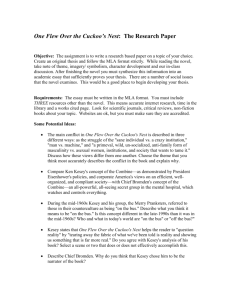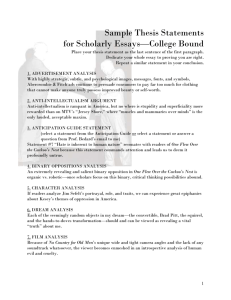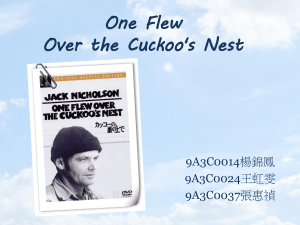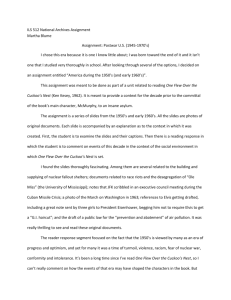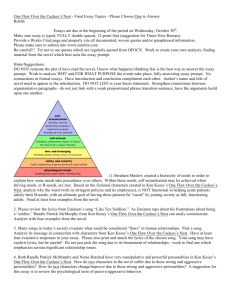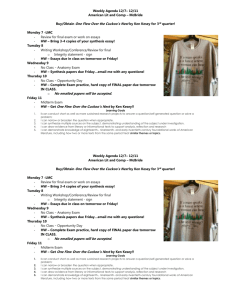Summary Response
advertisement
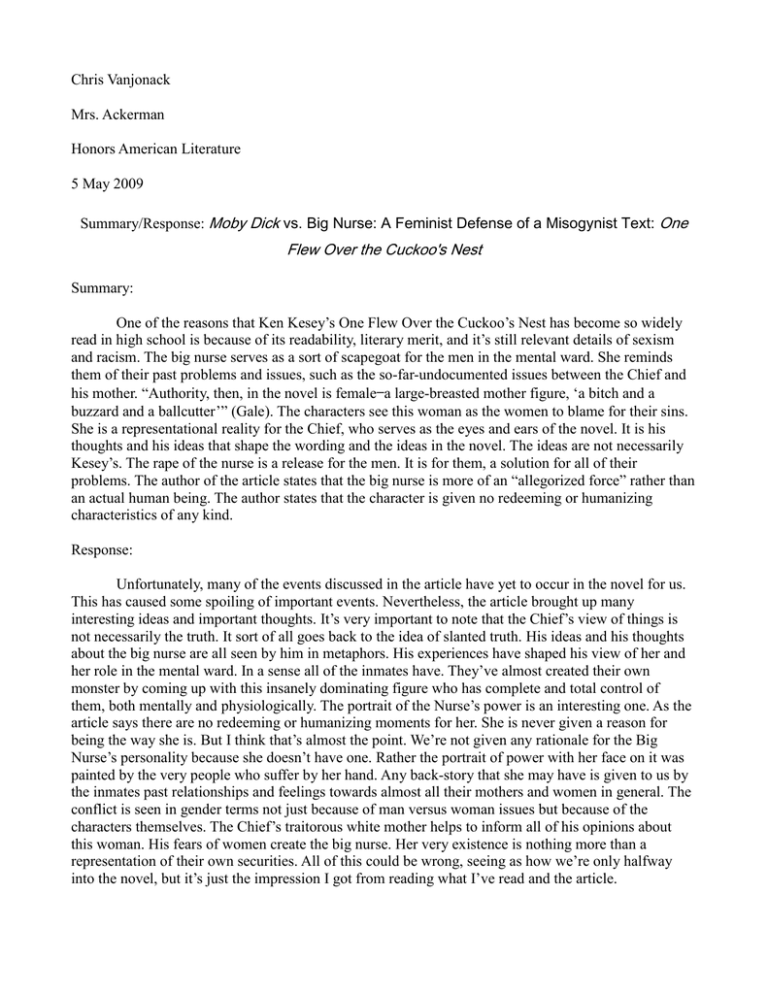
Chris Vanjonack Mrs. Ackerman Honors American Literature 5 May 2009 Summary/Response: Moby Dick vs. Big Nurse: A Feminist Defense of a Misogynist Text: One Flew Over the Cuckoo's Nest Summary: One of the reasons that Ken Kesey’s One Flew Over the Cuckoo’s Nest has become so widely read in high school is because of its readability, literary merit, and it’s still relevant details of sexism and racism. The big nurse serves as a sort of scapegoat for the men in the mental ward. She reminds them of their past problems and issues, such as the so-far-undocumented issues between the Chief and his mother. “Authority, then, in the novel is female—a large-breasted mother figure, ‘a bitch and a buzzard and a ballcutter’” (Gale). The characters see this woman as the women to blame for their sins. She is a representational reality for the Chief, who serves as the eyes and ears of the novel. It is his thoughts and his ideas that shape the wording and the ideas in the novel. The ideas are not necessarily Kesey’s. The rape of the nurse is a release for the men. It is for them, a solution for all of their problems. The author of the article states that the big nurse is more of an “allegorized force” rather than an actual human being. The author states that the character is given no redeeming or humanizing characteristics of any kind. Response: Unfortunately, many of the events discussed in the article have yet to occur in the novel for us. This has caused some spoiling of important events. Nevertheless, the article brought up many interesting ideas and important thoughts. It’s very important to note that the Chief’s view of things is not necessarily the truth. It sort of all goes back to the idea of slanted truth. His ideas and his thoughts about the big nurse are all seen by him in metaphors. His experiences have shaped his view of her and her role in the mental ward. In a sense all of the inmates have. They’ve almost created their own monster by coming up with this insanely dominating figure who has complete and total control of them, both mentally and physiologically. The portrait of the Nurse’s power is an interesting one. As the article says there are no redeeming or humanizing moments for her. She is never given a reason for being the way she is. But I think that’s almost the point. We’re not given any rationale for the Big Nurse’s personality because she doesn’t have one. Rather the portrait of power with her face on it was painted by the very people who suffer by her hand. Any back-story that she may have is given to us by the inmates past relationships and feelings towards almost all their mothers and women in general. The conflict is seen in gender terms not just because of man versus woman issues but because of the characters themselves. The Chief’s traitorous white mother helps to inform all of his opinions about this woman. His fears of women create the big nurse. Her very existence is nothing more than a representation of their own securities. All of this could be wrong, seeing as how we’re only halfway into the novel, but it’s just the impression I got from reading what I’ve read and the article. Works Cited Kesey, Ken. One Flew Over the Cuckoo's Nest. London: Penguin Books, 1962. Quinn, Laura. "Moby Dick vs. Big Nurse: A Feminist Defense of a Misogynist Text: One Flew Over the Cuckoo's Nest." Censored Books: Critical Viewpoints. Ed. Nicholas J. Karolides, John M. Kean, and Lee Burress Scarecrow Press, 1993. 398-413. Rpt. in Novels for Students. Ed. Diane Telgen. Vol. 2. Detroit: Gale, 1998. 398-413. Literature Resource Center. Gale. ARAPAHOE HIGH SCHOOL. 5 May 2009 <http://go.galegroup.com/ps/start.do?p=LitRC&u=litt24484>.
